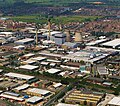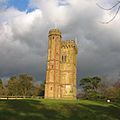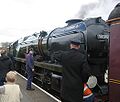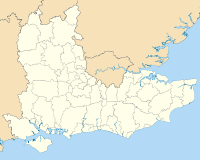Portal:South East England
The South East England Portal

South East England is one of the nine official regions of England in the United Kingdom at the first level of ITL for statistical purposes. It consists of the counties of Buckinghamshire, East Sussex, Hampshire, the Isle of Wight, Kent, Oxfordshire, Berkshire, Surrey and West Sussex. Major towns and cities in the region include Brighton and Hove, Canterbury, Milton Keynes, Southampton, Portsmouth, Slough, Reading and Oxford.
South East England is the third-largest region of England, with a land area of 19,072 square kilometres (7,364 sq mi), and is also the most populous with a total population of over nine million. The region contains eight legally chartered cities: Brighton and Hove, Canterbury, Chichester, Milton Keynes, Oxford, Portsmouth, Southampton and Winchester. The region's close proximity to London has led to South East England becoming a prosperous economic hub with the largest economy of any region in the UK, after London. The region is home to Gatwick Airport, the UK's second-busiest airport, and Heathrow Airport (the UK's busiest airport) is located adjacent to the region's boundary with Greater London. The coastline along the English Channel provides numerous ferry crossings to mainland Europe.
The region is known for its countryside, which includes two national parks: the New Forest and the South Downs, as well as the North Downs, the Chiltern Hills and part of the Cotswolds. The River Thames flows through the region and its basin is known as the Thames Valley. It is also the location of a number of internationally known places of interest, such as HMS Victory in Portsmouth, Cliveden in Buckinghamshire, Thorpe Park and RHS Wisley in Surrey, Blenheim Palace in Oxfordshire, Windsor Castle in Berkshire, Leeds Castle, the White Cliffs of Dover and Canterbury Cathedral in Kent, Brighton Palace Pier, and Hammerwood Park in East Sussex, and Wakehurst Place in West Sussex. The region has many universities; the University of Oxford is the oldest in the English-speaking world, and ranked among the best in the world.
South East England is host to various sporting events, including the annual Henley Royal Regatta, Royal Ascot and The Derby, and sporting venues include Wentworth Golf Club and Brands Hatch. Some of the events of the 2012 Summer Olympics were held in the south east, including the rowing at Eton Dorney and part of the cycling road race in the Surrey Hills.
In medieval times, South East England included much of the Kingdom of Wessex, which was the precursor to the modern state of England. Winchester was the capital of England after unification of the various states, including the kingdoms of Kent, Sussex and Mercia. Winchester stopped being the administrative capital of England some time in the 13th century as its influence waned while the City of London dominated commerce. The last monarch to be crowned at Winchester was Richard II in 1377, although the last monarch to be crowned by the Bishop of Winchester was Queen Mary I in 1553. (Full article...)
Selected article
The First Battle of Newbury was a battle of the First English Civil War that was fought on 20 September 1643 between a Royalist army, under the personal command of King Charles, and a Parliamentarian force led by the Earl of Essex. Following a year of Royalist successes in which they took Banbury, Oxford and Reading without conflict before storming Bristol, the Parliamentarians were left without an effective army in the west of England. When Charles laid siege to Gloucester, Parliament was forced to muster a force under Essex with which to beat Charles' forces off. After a long march, Essex surprised the Royalists and forced them away from Gloucester before beginning a retreat to London. Charles rallied his forces and pursued Essex, overtaking the Parliamentarian army at Newbury and forcing them to march past the Royalist force to continue their retreat.
Essex reacted by making a surprise attack on the Royalist lines at dawn, capturing several pieces of high ground and leaving Charles on the back foot. A series of Royalist attacks led to a large number of casualties and the slow retreat of Essex's force, which was driven from the central hill and almost encircled; Essex succeeded in rallying his infantry, however, and pushed forward in a counter-attack. The slowing of this counter-attack in the face of the Royalist cavalry forced Essex to send for reinforcements, who, while marching to him, were attacked and forced to retreat. This left a hole in the Parliamentarian line, dividing the army into two wings through which the Royalists hoped to pass, splitting the Parliamentarians and allowing Charles's troops to encircle and defeat them. In line with this, the Royalists moved forward to press the attack, but were forced to halt by the London Trained Bands. With night falling, the battle ended, and both exhausted armies disengaged. The next morning, low on ammunition, the Royalists were forced to allow Essex to pass and continue his retreat to London.
Reasons for the Royalist failure to defeat the Parliamentarians include shortage of ammunition, the relative lack of professionalism of their soldiers and the tactics of Essex, who compensated "for his much lamented paucity of cavalry by tactical ingenuity and firepower", countering Prince Rupert's cavalry by driving them off with mass infantry formations. Although the numbers of casualties were relatively small (1,300 Royalists and 1,200 Parliamentarians), historians who have studied the battle consider it to be one of the most crucial of the First English Civil War, marking the high point of the Royalist advance and leading to the signing of the Solemn League and Covenant, which brought the Scottish Covenanters into the war on the side of Parliament and led to the eventual victory of the Parliamentarian cause. (Full article...)
Selected pictures
Selected biography
Amanda Louise Holden (born 16 February 1971) is an English media personality, actress and singer. Since 2007, she has been a judge on the television talent competition show Britain's Got Talent on ITV. She also co-hosts the national Heart Breakfast radio show with Jamie Theakston on weekday mornings.
Holden grew up in Bishop's Waltham and took an interest in acting and musical theatre while at school. She played the title role in the musical stage show Thoroughly Modern Millie in 2004, for which she was nominated for a Laurence Olivier Award. Her acting credits on television include The Grimleys (1998–2001), Kiss Me Kate (1999–2001), Cutting It (2002–2004), Wild at Heart (2006–2008), and Big Top (2009). Holden has also presented various television shows for ITV, including The Sun Military Awards (2009–2014), Superstar (2012), This Morning (2014–2015, 2017), Text Santa (2015), and Give a Pet a Home (2015).
In 2013, Holden released her autobiography book, No Holding Back, which became a Sunday Times bestseller. In 2020, she released her debut studio album, Songs from My Heart, which reached the top 5 on the UK Albums Chart. (Full article...)
On This Day in South East England
30 May:
1928: The Patcham Pylon, a monumental gateway on the A23 north of Brighton, Sussex, was unveiled.
1961: Comedian Harry Enfield was born in Sussex.
Categories
Related portals
WikiProjects
Topics
Associated Wikimedia
The following Wikimedia Foundation sister projects provide more on this subject:
-
Commons
Free media repository -
Wikibooks
Free textbooks and manuals -
Wikidata
Free knowledge base -
Wikinews
Free-content news -
Wikiquote
Collection of quotations -
Wikisource
Free-content library -
Wikiversity
Free learning tools -
Wikivoyage
Free travel guide -
Wiktionary
Dictionary and thesaurus









![Image 8 Credit: Michael Wilmore The Kent & East Sussex Railway was opened by Colonel H.F. Stephens, the railway engineer, in 1900. At its fullest extent, it ran nearly 22 miles[35km] from Robertsbridge on the Tonbridge to Hastings main line to Headcorn on the main line between Tonbridge and Ashford, Kent. More about the Kent & East Sussex Railway... (from Portal:Kent/Selected pictures)](http://upload.wikimedia.org/wikipedia/commons/thumb/2/2f/KentAndEastSussexRailway%28MichaelWilmore%29Oct2005.jpg/120px-KentAndEastSussexRailway%28MichaelWilmore%29Oct2005.jpg)























































































































